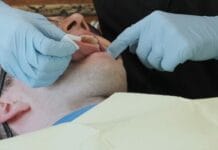I’m sure I’m not the only hygienist that has pondered why patients are so reluctant to provide complete disclosure of their medical history before dental treatment. More times than I would like to admit I’ve asked a patient “Have you had any changes in your medical history?” To which they would promptly reply “No.” Only then, to disclose a list of surgeries, new medications, and newly diagnosed systemic disease when the dentist comes in for the exam, leaving me picking my jaw up off the floor. So, the question remains, why don’t patients understand the importance of full disclosure when it comes to medical history and dental treatment? Further, what can we do to change this misunderstanding?
The answer to why patients do not understand the importance of disclosing medical information is because most patients simply do not know that many medications and systemic diseases have oral manifestations. They honestly do not think it is relevant to their treatment. When I’ve asked about medical history in the past, I’ve gotten answers like, “No changes that would affect anything you are doing,” or “Why do you need to know that just to clean my teeth?” I’m sure you have had similar responses, which just reinforces their lack of knowledge.
A large part of our job as dental hygienists is education. We need to be more proactive about educating our patients. I find the best time to discuss the oral-systemic disease connection and side effects of medications that might have an oral manifestation, are when I am reviewing medical history. Patients are often quite impressed when you take the time to explain why it is important to have an accurate, updated medical history, and how it can help us better treat them safely.
I discovered, quite by accident, a great way to get patients to give you the information you need to update their medical history properly when I was fresh out of hygiene school. I worked for an amazing dentist who happened to employ a front desk team who wasn’t familiar or educated about the clinical side of dentistry. I asked the office manager to please have patients fill out a new medical history form every two years. However, she did not see the importance of my request and never had patients fill out the new medical history forms. As I reviewed my patients’ medical history, after I seated them in my chair, I was shocked at how open and willing patients were to answer the many specific questions I had for them. That is when I realized asking specific, open-ended and/or descriptive questions, rather than generalized questions, yielded the most accurate information.
Some of the questions I like to ask at every appointment are as follows:
- Have you had any surgeries, hospitalizations, or gone to the ER in the past year?
- What medications are you currently taking?
- What are you allergic to?
- Do you smoke, vape, or use chewing tobacco?
- Do you have any autoimmune diseases such as thyroid disease, diabetes, Sjogren’s disease, lupus, Crohn’s disease, or rheumatoid arthritis?
- Are you currently being treated for any medical condition by a doctor such as high cholesterol, blood pressure, or diabetes?
- Have you been diagnosed with sleep apnea? If so, do you use a CPAP?
- Do you see your primary care physician annually?
Depending on the patient’s answers, I will often follow up with other questions. For example, if they have diabetes, I like to inquire about their current hbA1c. It is good to know the patients C-reactive protein level as well, to help determine their risk of developing periodontal disease.
Asking specific questions like these can make the appointment go smoother and reduce frustration for both the clinician and the patient. Having specific information from patients can help you better treat patients. Also, it can help you understand the contributing factors if they present with excessive inflammation or a high caries risk. I encourage you to try implementing some of these questions with your patients. I’m positive it will lead to less frustration, more education, and hopefully, happier and healthier patients.
SEE ALSO: The Importance of Knowing a Patient’s Health History
DON’T MISS: Cutting Through All the Pre-Medication Confusion












